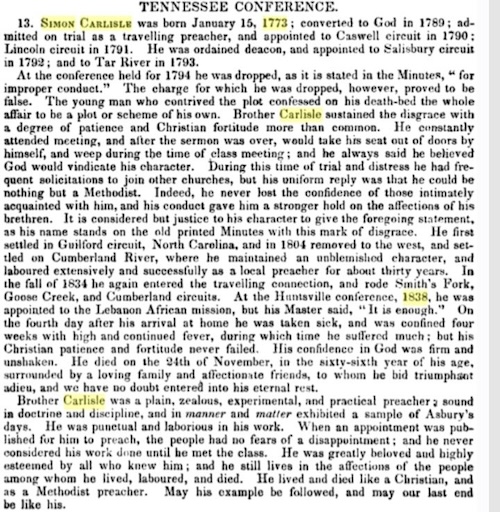“God Will VINDICATE Me,” Insisted Carlisle, and Was Right

[Above: Tennessee Conference obituary reminding readers of Carlisle's case.]
GOD IS ABLE to vindicate those who trust him. (Psalm 35:24, Job 16:19, etc. Peter Cartwright (as well as a contemporary Methodist magazine) related an incident in which one man trusted God for vindication while an adversary rejected reproof.
Simon Carlisle was born on this day 15 January 1773 and died 24 November 1838. Becoming a follower of Christ in 1789, he immediately began proclaiming the gospel. Within a year the Methodist Church appointed him to preach along a circuit of churches. Three years later (1793) he was appointed to North Carolina’s Tar River circuit where the following event took place. Wrote Cartwright,
There was a wealthy family at or near one of his appointments [i.e., near a preaching place]. The old gentleman and lady were members of the Church; but they had a very profligate son, who behaved disorderly at one of Carlisle’s appointments, and Carlisle sharply reproved him for his disorderly conduct, at which the young man took great umbrage, and swore he would have satisfaction out of Carlisle.
The house of the father of this young man was the preacher’s home [i.e., the place where he stayed when at that stop in his circuit]. When Carlisle came round next time, he was, as usual, invited by this old brother home with him. Brother Carlisle said, as he had offended his son, perhaps he had better not go; but the old brother and sister insisted he should go; for they knew their son was to blame altogether, and that Carlisle had done nothing but his duty in reproving him; so he went. This young man was at home, but slunk about, and would not be [sociable] with Carlisle.
The next morning, while Carlisle was saddling his horse to ride to his next stop, the son laid a trap for Carlisle.
Shortly after Carlisle started, the young man pretended to miss [a pair of] pistols, and declared he knew that Carlisle had stolen them. The old people remonstrated against any such imputation; but he persisted in affirming he knew that the preacher had stolen his pistols, and off he started, got a writ and an officer, and pursued Carlisle, and before he reached his next appointment they overtook him. The officer informed him of the allegation, and that he had a writ for him, and that he was his prisoner. Carlisle, conscious of his innocence, told the officer that he was welcome to search him, and handed over his saddle-bags, when, lo and behold, there were the pistols at the bottom of them. What could he say? He protested his innocence, but submitted to the law, was found guilty, and only escaped being incarcerated in prison by the father of this mean young man going his bail till further trial.
We will not narrate the trouble and cost Carlisle was put to before he got clear of this malicious prosecution. Suffice it to say, during the pendency of this prosecution, the Annual Conference came on, and Carlisle had to answer to this criminal charge; but what could he say? He had no evidence of his innocence, and by possibility could have none. The Conference did not believe him guilty, but his guilt was sworn to by this young man. In this dilemma, into which the Conference was thrown, Carlisle rose and requested the Conference, for the honor of the cause of God, that they would expel him until God should, in some way, vindicate his innocence. He affirmed he was innocent, and that he believed God would shortly make his innocence manifest to all.
Reluctantly the Conference expelled him, citing as its reason “improper conduct.” Carlisle married and began a family. The Methodists offered him another circuit, but he declined for the time being, because he needed to support his family.
But the circumstance that triumphantly vindicated his innocence remains yet to be told. The young man who pursued him so maliciously, in about nine months after Carlisle was arrested, was taken down with a fever common to that region of country. The best medical aid was called in; he was faithfully attended and administered unto. His parents were much alarmed for his safety and his salvation.
He was talked to and prayed with, but to no purpose. His physicians told him he must die. He then said he could not die until he disclosed one important matter. His parents were called in, and he frankly told them and others that he put his pistols in Carlisle’s saddle-bags himself; and shortly after the disclosure he expired, without hope of mercy.
—Dan Graves
- - - - - -
For more on circuit riders, see Christian History #45 Camp Meetings & Circuit Riders
Other Events on this Day
- Dying Alone in China, Burns Wrote of His Faith in a Goodbye to His Mother
- JEROME’S INCREDIBLE TALE OF THE HERMIT PAUL






